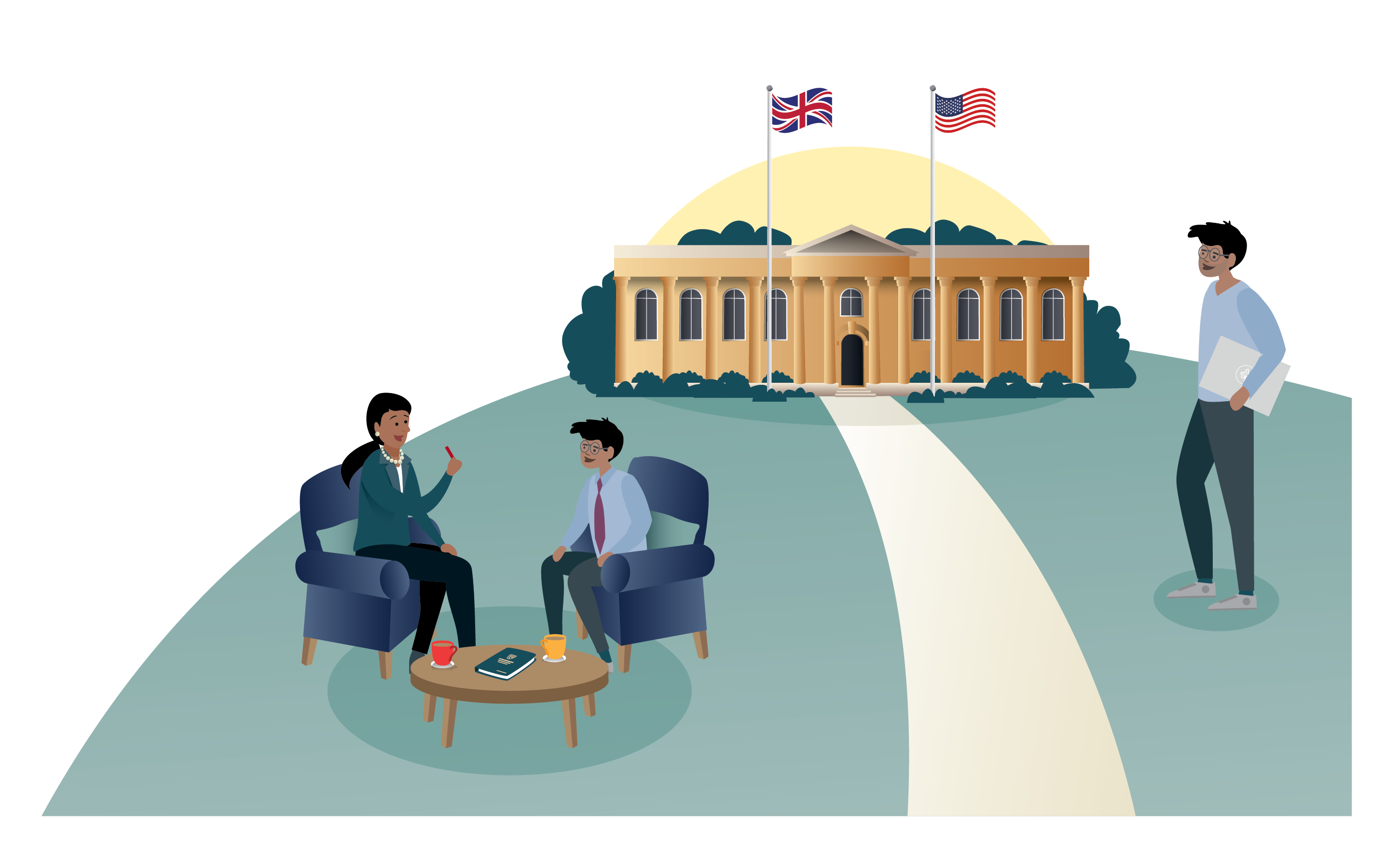Expert Insights
How to Get Into Cambridge University
Published 6th June 2025 by Alastair

Compared to other top universities, Cambridge's rigorous academic standards and rich history set it apart as a leading institution for higher education.
Though often overshadowed by its rival, Oxford, it is ranked consistently among the top universities globally. Cambridge boasts an impressive alumni network, including Nobel laureates, leading scientists, and influential politicians. With staggering application numbers and competitive acceptance rates, gaining admission to Cambridge is still no small feat.
In this guide, we aim to provide aspiring applicants with a step-by-step guide for navigating the intricate application process with precision and care. Each step is crucial, and by following our guide, prospective students can enhance their chances of securing a coveted place at one of the best universities in the world.
When applying to Cambridge, students must either select a specific college or submit an open application, where a college is assigned to them automatically. While all colleges belong to the same university and offer the same high academic standards, they differ in size, location, facilities, and atmosphere.
There is no “best” college, and your choice will not affect your chances of admission. All applicants are assessed according to the same rigorous academic standards. If one college receives more strong applicants than it can accommodate, your application may be “pooled” and considered by another college.
When choosing a college, consider the following:
The size and student population. Some colleges are larger and more vibrant, while others are smaller and more intimate.
Location within Cambridge. Central colleges are close to faculties and libraries, while others are in quieter residential areas.
Accommodation options. Some colleges offer on-site housing for all years of study, while others do not.
Facilities and extracurriculars. Think about what matters to you—sports facilities, music practice rooms, or a particular society or tradition.
Co-ed or single-gender colleges. While most are mixed, some, like Murray Edwards, are for women only.
If you’re unsure, an open application is a perfectly valid choice. It gives you the same chance of admission, and the university will ensure your application is fairly distributed.
Ultimately, your college will be your academic and social home. It’s worth reading college websites, watching virtual tours, or attending open days to get a feel for where you’d be happiest.
These requirements can vary significantly between courses, encompassing criteria such as academic grades, standardised test scores, and personal statements. Ignoring or misunderstanding these requirements could result in applicants not meeting the necessary qualifications for admission to their desired program.
Consequently, comprehending the entry criteria ensures that applicants can adequately prepare and tailor their academic and extracurricular endeavours to meet Cambridge's expectations, increasing their chances of successful admission.

GCSE grades, or their international equivalent (if applicable), can play an important role in the Cambridge University application process. Typical expectations demand high grades, often 8s or 9s (As and A*s for iGCSE students), particularly in relevant subjects related to the chosen course of study.
These grades serve as an initial indicator of an applicant's academic ability and potential to excel at the university level. However, while important, GCSE grades are just one component of the holistic application review process, alongside personal statements and interviews.
Generally speaking, the university admissions team will consider these grades alongside other factors to comprehensively understand an applicant's academic aptitude, interests, and suitability for the chosen course, including, more importantly, A Level grades (or their equivalent).
So, while high GCSE grades are valued, like Oxford (see our Oxford guide), Cambridge looks at applications holistically, emphasising a student's recent merits with more weighting.
As mentioned in passing the section above, Cambridge University treats IGCSEs as equivalent to GCSEs. Although there are no formal minimum grade requirements, strong performance in IGCSEs can enhance an applicant's profile, especially when contextualised within the performance of their school. For instance, achieving top grades in a lower-performing school may be viewed favourably. However, IGCSE results are just one component of a holistic admissions process that also considers A-Level (or equivalent) performance, personal statements, admissions assessments, and interviews.

Typical A-level offer ranges at Cambridge University often fall within the AAA to A*AA spectrum, though this can vary depending on the course and individual circumstances. Equivalent qualifications such as the International Baccalaureate (IB), Advanced Placement (AP) exams, and other national curricula may also be accepted, provided they meet the university's standards.
To find out whether your your qualifications would be accepted to the courses you are applying to, click here.
For 2025 entry, we recommend visiting Cambridge's website, finding the course you are looking to apply to, and reading their entry requirements.
Examples of courses with specific subject requirements at Cambridge University include:
Meeting subject requirements is crucial for admission, as it ensures applicants possess the fundamental knowledge and skills to excel in their chosen field of study.
Contextual offers are a form of adjusted admission criteria used by Cambridge University to account for socio-economic background and educational context when making offers to prospective students. These offers consider factors such as the applicant's school performance relative to the average performance within their school or region and broader socio-economic indicators.
Socio-economic background and educational context can influence offer conditions by recognising that students from disadvantaged backgrounds may face additional challenges in achieving high grades or meeting traditional entry requirements. Contextual offers aim to level the playing field by acknowledging these challenges and providing opportunities for talented students who may not have had access to the same resources or support systems as their more privileged peers.
Cambridge University offers various programs and support initiatives for students from disadvantaged backgrounds, such as the Cambridge Bursary Scheme, which provides financial assistance to students from low-income households. Additionally, outreach programs and access initiatives target schools and communities with historically low progression rates to higher education, aiming to raise aspirations and provide guidance and support throughout the application process. These efforts demonstrate Cambridge's commitment to widening access and ensuring that talented students from all backgrounds have the opportunity to study at the university.
Cambridge admissions assessments are designed to evaluate core academic abilities such as problem-solving, critical thinking, and subject-specific knowledge. These tests help admissions tutors differentiate between academically strong candidates and ensure applicants are prepared for the intellectual challenges of their chosen course.
There are two main types of assessments used at Cambridge:
Pre-interview assessments, taken in October before interviews are offered
At-interview assessments, taken shortly before or during the interview itself
Whether an assessment is required, and which type, depends on both the course and the college. For example, applicants for Economics may need to sit the TMUA (Test of Mathematics for University Admission), while Law applicants typically take the Cambridge Law Test. Those applying for Medicine usually take the BMAT, and Natural Sciences applicants may be assessed on their maths and science reasoning skills.
Additional assessments include:
Thinking Skills Assessment (TSA) – Used for courses such as Economics, Land Economy, and Computer Science. It measures critical thinking and problem-solving through multiple-choice and essay-based questions.
Cambridge English Language Assessment – Required for non-native English speakers, this test evaluates English proficiency to ensure students can engage fully with university-level study.
It is essential that applicants check the exact requirements for their course on the official University of Cambridge admissions website, as test formats and requirements can change. Missing the registration deadline for a pre-interview assessment will usually result in disqualification.
Preparation is key. While most assessments focus on aptitude rather than rote knowledge, becoming familiar with the format, practicing past papers, and working under timed conditions can make a significant difference. For at-interview assessments, there may be less opportunity for preparation, but applicants can still build confidence by reviewing core subject content and staying informed about recent developments in their field.
Though admissions assessments are only one part of Cambridge’s holistic application process, strong performance can significantly enhance a candidate's chances of being shortlisted for interview and ultimately receiving an offer.
Non-native English speakers applying to Cambridge University must demonstrate English proficiency to ensure they can fully engage with coursework and participate effectively in university life. Accepted tests typically include the International English Language Testing System (IELTS), the Test of English as a Foreign Language (TOEFL), and the Cambridge English exams (such as C1 Advanced or C2 Proficiency).
For undergraduate programs, the minimum required IELTS scores are typically 7.0 overall, with at least 7.0 in each component.
For TOEFL, scores usually range around 100 overall, with minimum scores of 25 in each section.
Cambridge English exams often require a minimum Grade C or higher in Advanced (CAE) or Proficiency (CPE) levels.
A strong Cambridge personal statement is a crucial part of a successful university application. It allows applicants to highlight their academic interests, achievements, and motivation for choosing a specific subject. Cambridge admissions tutors pay close attention to personal statements to assess an applicant’s suitability for their chosen course. They look for clear evidence of intellectual curiosity, critical thinking, and genuine passion for the subject. A standout statement does more than list accomplishments. It reflects on how academic experiences have shaped the applicant’s thinking and prepared them for university-level study.
Applicants should demonstrate how they have explored their subject beyond the classroom. This might include reading academic books or articles, attending relevant talks, completing online courses, or taking part in subject-specific projects or competitions. Cambridge values supercurricular activities that deepen understanding and show commitment to learning. While extracurriculars can be mentioned briefly, the main focus should remain on academic development and subject engagement.
Alongside the personal statement, academic references play an important role in the Cambridge University application process. References provide an external perspective on the applicant’s academic strengths, work ethic, and potential to succeed in a highly rigorous environment. Tutors use references to support the claims made in the personal statement and to assess whether the applicant is a good fit for the course.
A strong reference should confirm the applicant’s subject interest and predicted grades. It should also highlight relevant achievements, provide context about the applicant’s educational background, and explain any personal circumstances or challenges. When written with insight and specificity, a reference can significantly strengthen an application by reinforcing the qualities Cambridge looks for in a prospective student.

Around 75% of applicants are invited to attend one or more interviews, which typically take place in December. These interviews give admissions tutors the chance to assess your academic potential in a way that goes beyond your grades and written application.
Each interview is subject-focused and usually lasts between 20 and 45 minutes. They are conducted by college academics and are designed to resemble the kind of discussion you might have in a supervision at Cambridge. You may be asked to solve problems, interpret data, or discuss ideas from your subject area. The aim is not to test what you already know, but to see how you think, how you approach unfamiliar material, and how you respond to new ideas or feedback.
Tutors are looking for students who show a strong interest in their subject. They want to see that you can think clearly, explain your reasoning, and respond thoughtfully when challenged. It’s perfectly normal not to know every answer. What matters more is your willingness to engage with the material and think things through carefully.
Good preparation can help you feel more confident. Practising how to explain your thought process aloud is very useful. You should also be ready to talk about your personal statement, especially any books, research, or experiences you’ve mentioned. Reviewing subject content and thinking about how you approach complex problems will also help. Some students find mock interviews helpful, especially if they simulate the academic tone and style of questioning used at Cambridge.
Interview performance is just one part of the overall admissions decision. Even if you feel your interview didn’t go perfectly, you may still impress the tutors with your potential.
To learn more about how Ivy Education can help you with the interview prep process, contact us today, or learn more about our University Mock Interviews & interview prep with our admissions experts.
Extended Project Qualifications (EPQ) and other relevant certifications hold significant value in the Cambridge University admissions process as they demonstrate a student's ability to engage in independent research and critical analysis, which are highly valued skills at the university level.
EPQs allow students to explore topics of interest in greater depth, showcasing their intellectual curiosity and academic initiative. Similarly, other relevant certifications, such as additional A-level subjects, can demonstrate a candidate's breadth of knowledge and academic versatility, enhancing their overall application.
Work experience plays a crucial role in strengthening an applicant's candidacy for vocational courses like medicine. Practical exposure to healthcare settings provides valuable insights into the field and demonstrates a candidate's commitment to pursuing a career in medicine.
Tutors look for evidence of relevant work experiences, such as shadowing doctors, volunteering in healthcare settings, or participating in research projects, as it can provide applicants with firsthand experiences that inform their understanding of the profession and their motivations for pursuing it.
Our University Consultants can help applicants flesh-out out their applications and advise them on the best steps to take while navigating the Cambridge admissions process.
Extenuating circumstances are considered during the admissions process at Cambridge University to ensure fair treatment for applicants who have faced significant challenges or disruptions that may have affected their academic performance or ability to meet entry requirements.
For instance, if an applicant's academic performance was adversely impacted by a prolonged illness or family crisis, they may submit supporting documentation, such as medical records or letters from school counsellors, to provide context for their situation.
Admissions tutors carefully review these extenuating circumstances on a case-by-case basis, considering their impact on the applicant's academic achievements and potential. In some cases, adjustments may be made to entry requirements or additional support may be provided to accommodate applicants facing significant challenges beyond their control.
Ultimately, the goal is to ensure that all applicants are evaluated fairly and holistically, considering the context in which their academic achievements were attained.
A strong candidate will have high grades across the board in both their GCSE and (more importantly), A-Level grades, reflecting their commitment, diligence, and aptitude in the subject they will be taking on their desired course.
Undertaking an EPQ allows students to delve into a topic of personal interest, fostering independent research and critical thinking skills.
Universities often value EPQs as they demonstrate a student's ability to engage in self-directed study and manage a substantial project, qualities that are highly sought after in higher education.
Ivy Education can help with personal statement building, but here are threetips we can give you for free:
Unique academic activities could include conducting independent research, participating in specialised workshops or seminars, or completing challenging coursework beyond the standard curriculum.
Extracurricular activities like founding a community service project, leading a student organisation, or engaging in cultural exchanges can highlight leadership, teamwork, and adaptability.
Link your experiences to the chosen course by emphasising how each activity has contributed to your understanding of the subject, developed relevant skills, or reinforced your commitment to further study in that field. Demonstrate the connections between your experiences and the specific goals and values of the course or program you're applying to.
Common interview questions may include discussing academic interests, problem-solving tasks, and hypothetical scenarios related to the chosen subject.
Practising through mock interviews is crucial for familiarising oneself with the interview format, gaining confidence, and refining responses to common questions.
A good candidate will demonstrate critical thinking by carefully analysing questions, breaking down complex problems, and explaining the reasoning behind each step. They will also know how to articulate thought processes by vocalising how they approach a problem, outlining possible solutions, and discussing the implications of each choice.
Applicants must also show genuine interest in the subject by discussing relevant experiences, academic achievements, and future aspirations related to the course of study, and communicate enthusiasm and passion by speaking confidently, maintaining eye contact, and using engaging language to convey excitement for the subject matter.
DO: Start your preparation early. The earlier, the better! Typically, many students start preparing their Cambridge applications in the first two terms of year 12.
DO: Wider Reading and Research. Beyond the school curriculum, students can explore topics in greater depth and breadth by delving into academic journals, articles, and books related to their field of interest and research projects. Examples of relevant research projects or extracurricular activities might include conducting experiments, attending conferences, participating in online courses, or engaging in discussions with professionals in the field.
DO: Extracurricular Activities. We're not talking about extracurricular activities related to the course the student is looking to take, but rather, activities that showcase your well-rounded character with interests outside your chosen field. This could be a sport, a hobby, volunteering, skills workshops or online courses.
DO NOT: Miss Deadlines. Cambridge has strict application deadlines. Ensure you know them and submit all materials on time. If you feel that you have missed a deadline or are unclear on when everything needs to be submitted, contact us today.
DO NOT: Be Discouraged by Myths: Don’t let common myths about Cambridge (e.g., it’s only for the super-rich, or it’s impossible to get in) discourage you from applying. Admissions are merit-based.
DO NOT: Underestimate the Interview: The interview is a critical part of the application process. Don’t go in unprepared. Practice discussing your subject and answering typical interview questions with one of our admissions specialists.

Our Admissions Consultants
can provide personalised guidance tailored to individual strengths,
weaknesses, and goals, helping students navigate the complex admissions
process with confidence. This includes:
Our Oxbridge Tutors can help students prepare for:
Students should carefully select A-levels or equivalent qualifications that align with the prerequisites and recommended subjects for their desired Cambridge course, ensuring they have the necessary background knowledge and skills.
Choosing relevant subjects not only demonstrates a student's genuine interest and commitment to their chosen field but also provides a solid academic foundation for university-level study.
To learn more about A Levels, read our guide here.
Focus on building strong academic foundations by excelling in GCSEs, particularly in subjects relevant to the intended Cambridge course.
Begin researching Cambridge courses and their entry requirements, considering subjects and qualifications needed for future A-level studies.
Select A-levels or equivalent qualifications that align with the desired Cambridge course, ensuring they meet specific subject requirements.
Dedicate time to mastering A-level subjects, focusing on understanding key concepts, practicing exam techniques, and achieving high grades.
Concentrate on A-level studies, prioritising revision and exam preparation to achieve top grades in line with Cambridge's high academic standards.
Start crafting personal statements, highlighting academic achievements, extracurricular involvement, and reasons for choosing the chosen course at Cambridge.
Engage in extracurricular activities complementing academic interests, demonstrating leadership, teamwork, and a genuine passion for the subject.
The transition from Year 11 to Year 12 marks a critical period when students should focus on selecting A-level subjects and laying the groundwork for future academic success.
In Year 13, students should prioritise A-level studies while also dedicating time to crafting their personal statements and engaging in extracurricular activities, ensuring a well-rounded and competitive application to Cambridge University.
Draft the personal statement at the beginning of Year 13 to allow ample time for reflecting, revising, and refining ideas and experiences. Starting early enables students to carefully craft their narrative, incorporating academic achievements, extracurricular involvement, and future aspirations, resulting in a well-rounded and compelling statement.
It's advisable to seek feedback from teachers, advisors, and tutors before the application deadline to allow for multiple revisions and improvements. By seeking feedback early, students can benefit from valuable insights, suggestions, and critiques, ensuring that their personal statement effectively showcases their strengths and suitability for Cambridge University.
Additionally, early feedback allows students ample time to implement changes, address any areas of weakness, and polish their personal statements to perfection before submitting their application.
It's advisable to begin preparing for admissions tests typically at the end of Year 12 or the beginning of Year 13, allowing ample time to familiarise yourself with the test format, content, and question types. Starting early provides sufficient time to identify areas of strength and weakness, develop effective study strategies, and gradually build up skills and confidence for the test.
Summer holidays offer an excellent opportunity for intensive test preparation, as students have fewer academic commitments and more uninterrupted study time. Use this period to dive deep into test materials, complete practice questions and mock exams, and focus on areas that need improvement.
Establish a structured study schedule, set specific goals, and allocate dedicated time each day for test preparation, balancing study with relaxation and leisure activities to maintain motivation and avoid burnout.
The UCAS application deadline for Cambridge is typically in mid-October, usually around October 15th each year.
It's crucial to emphasise the importance of completing and submitting the application well before the deadline. Cambridge University advises applicants to aim to submit their applications by early October, allowing time for any unexpected delays or technical issues.
Submitting early also gives applicants peace of mind, knowing that their application has been successfully submitted and gives them time to address any last-minute concerns or revisions. Furthermore, submitting early demonstrates to admissions officers that you are organised, proactive, and committed to your application, which can positively influence their perception of your candidacy.
Ivy Education can help you submit your application on time. If you need help with your Cambridge applications, contact us today.
It's highly recommended that interview preparation begins as soon as the application is submitted to Cambridge University, as interview invitations can be sent out shortly after.
Early preparation allows candidates to familiarise themselves with common interview questions, refine their responses, and build confidence in their communication skills, ensuring they are well-prepared for the interview process.
Mock interviews with teachers or using online resources are excellent ways to practice and prepare for Cambridge University interviews. Teachers can provide valuable feedback on interview performance, offer insights into areas for improvement, and help students refine their responses to common interview questions.
Online resources such as interview preparation websites, sample questions, and video tutorials can also be beneficial for practising interview techniques, gaining familiarity with the format, and developing effective communication strategies.

Building a path to Cambridge University demands early academic diligence, meticulous preparation, and unwavering dedication. Each step is pivotal, from cultivating strong academic foundations to navigating the application process with precision.
Embrace challenges, seek guidance, and never underestimate your potential. You can achieve your dreams of studying at Cambridge with perseverance and passion.
Start your journey with Ivy Education today, and let your aspirations soar towards Cambridge University!
Cambridge University typically requires applicants to have strong GCSE or equivalent qualifications with top grades in relevant subjects like English, Maths, and Sciences.
It's recommended to start preparing for Cambridge University early in secondary school, focusing on building strong academic foundations and engaging in extracurricular activities.
Cambridge typically looks for A-level subjects relevant to the chosen course of study, so students should take subjects that align with their academic interests and future goals.
If you're a domestic student, GCSE grades play a significant role in the Cambridge admission process, as they demonstrate academic capability and potential for success at the university level.
To prepare for Cambridge admissions tests, students should familiarize themselves with the test format, practice past papers, and consider seeking guidance from tutors or online resources.
Personal statements for Cambridge should highlight academic achievements, extracurricular involvement, and a genuine passion for the chosen subject, demonstrating readiness for university-level study.
To gain relevant work experience, students can seek internships, volunteering opportunities, or part-time jobs in fields related to their academic interests, demonstrating practical skills and commitment to their chosen field.
The interview process at Cambridge typically involves subject-specific discussions, problem-solving tasks, and assessing candidates' academic potential and suitability for the course.
Cambridge tutors look for qualities such as intellectual curiosity, critical thinking skills, and a genuine passion for the subject during interviews, seeking students who demonstrate academic potential and enthusiasm for learning.
Yes, Cambridge accepts alternative qualifications like the IB or Pre-U, as long as they meet the entry requirements for the chosen course of study.
Cambridge offers various programs and support for students from disadvantaged backgrounds, including bursaries, outreach programs, and access initiatives to ensure equal opportunities for all.
The timeline for submitting an application to Cambridge University typically falls in October, with specific deadlines varying depending on the course and applicant's educational background.
Yes, students can apply to both Cambridge and Oxford in the same application cycle, but they must choose one as their firm choice and the other as their insurance choice.
Resources available to help prepare applications for Cambridge include guidance counselors, online forums, official university websites, and outreach programs.
The admissions process at Cambridge University is highly competitive, with a large number of qualified applicants vying for limited spots, emphasising the importance of presenting a strong application and demonstrating academic excellence. You can see the 2023 numbers in our guide: What is Oxbridge?
Ivy Education are here to help. Contact us today, so we can best understand your individual requirements.
Contact Us











